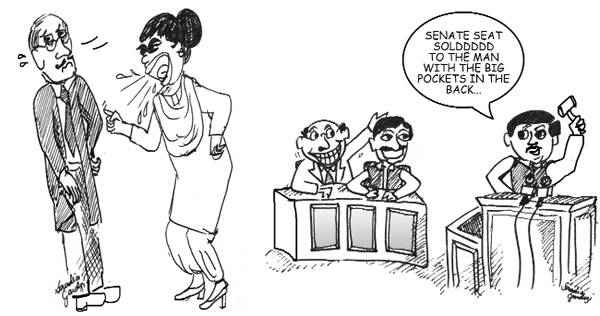
For the people

Sir,
This is in response to reports about horse trading in Senate elections, and the argument made by certain political parties against making a new law to prevent these non-democratic practices. This country has seen drug dons, smugglers and land tycoons buying votes for Senate seats in the past, under elected democratic governments as well as in engineered elections held by military usurpers.
The biggest threat to democracy and its future in Pakistan is posed not just by our establishment, but by the greed, corruption and unethical practices of our politicians, who often lack even the most basic, essential, ethics required for a system to succeed.
It wa surprising to hear some of them say there wasn’t enough time for new legislation. Time has never been short for overnight legislation or ordinances that protect vested interests. What we have never seen is an emergency legislation to protect lives and property of ordinary citizens, or punishing paid public office holders for acts of omission causing billions in losses due to tax evasion, or conniving with criminals to help them escape prosecution.
When state institutions and public office holders are themselves involved in violating the constitution, then city states like Dubai cannot be expected to hand over wanted criminals no matter how many red carpets we lay for them to facilitate their hunting trips to kill rare species of birds. How can we expect our leaders and public office holders to stand up and protect our real national interests or security concerns when they are under obligations to foreign countries where their assets or families are located?
Ali Malik,
Lahore.
P is for Profit
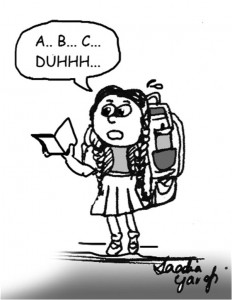
Sir,
It is disappointing to see the plight of private schools in Pakistan. These schools claim to impart quality education using state of the art facilities, with hard work, effort and determination. The reality is often contrary to that. Many private schools have more or less emerged as commercial, for-profit ventures. They aim to generate maximum revenue, neglecting the quality of education, and that is why their standards are gradually dwindling.
This decline in quality is attributed to several factors, the most prominent being lack of skilled teaching and managerial staff. The administrative and the managerial staff managing and running the schools lack expertise and skills required to get the most out of teachers and students in an enabling environment. The teachers they hire are also not properly trained. This impedes the creation of an effective and balanced educational platform that could prepare and nurture disciplined, mature, refined and cultivated individuals for tomorrow.
There is a dire need for the Ministry of Education to devise a mechanism to improve the quality of education in both government and private schools of Pakistan.
Aiyza Javaid,
Lahore.
Freedom and responsibility
Sir,
When he was an assemblyman from New York, Theodore Roosevelt gave a famous speech that discussed not only the theoretical reasons why every man should be involved in politics, but also how one could fulfill their duty of ensuring good government. I want to share with my fellow Pakistanis an excerpt from that speech. There is a lot we can learn from it.
“No man can be a good citizen who is not a good husband and a good father, who is not honest in his dealings with other men and women, faithful to his friends and fearless in the presence of his foes, who has not got a sound heart, a sound mind, and a sound body...
...It ought to be axiomatic in this country that every man must devote a reasonable share of his time to doing his duty in the political life of the community. No man has a right to shirk his political duties under whatever plea of pleasure or business; and while such shirking may be pardoned in those of small cleans it is entirely unpardonable in those among whom it is most common–in the people whose circumstances give them freedom in the struggle for life.
In so far as the community grows to think rightly, it will likewise grow to regard the young man of means who shirks his duty to the State in time of peace as being only one degree worse than the man who thus shirks it in time of war.
A great many of our men in business, or of our young men who are bent on enjoying life (as they have a perfect right to do if only they do not sacrifice other things to enjoyment), rather plume themselves upon being good citizens if they even vote; yet voting is the very least of their duties, nothing worth gaining is ever gained without effort.
You can no more have freedom without striving and suffering for it than you can win success as a banker or a lawyer without labor and effort, without self-denial in youth and the display of a ready and alert intelligence in middle age. The people who say that they have not time to attend to politics are simply saying that they are unfit to live in a free community.”
Zahid Khan,
Islamabad.
Touristan

Sir,
Traveling brings people in contact with each other. Tourism has an educational element. It can foster an understanding between people and cultures and provide opportunities of cultural exchange between hosts and guests.
Tourists do not bring only their suitcases to the destinations they visit, they also bring along their lifestyles, habits and customs. At the same time, tourists are also willing to discover a different culture and a different lifestyle.
Tourism helps publicize a country in different parts of the world. Pakistan, the ‘Land of Adventure and Nature’, with diverse cultures, people and landscapes, attracted 1 million tourists in 2012. We need to build on that and encourage tourism for the sake of our country’s economic progress and as a source of cultural exchange that will connect us with the rest of the world.
Syeda Unzela Mushtaque,
Karachi.
Connections
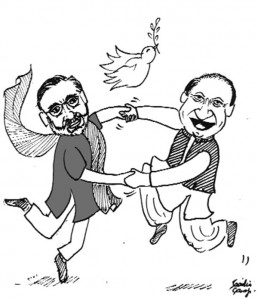
Sir,
Two recent events formed a subtle connection in my mind. On 25 January, India and the United States announced a “breakthrough” in negotiations to operationalise the long-stalled nuclear deal. A second achievement in the field of diplomacy: the nuclear agreement signed between India and Sri Lanka in New Delhi on 16 February as visiting Sri Lankan President Maithripala Sirisena and Prime Minister Modi watched.
In wake of all this a brief flicker of optimism, bilateral relations have soured once again between India and Pakistan. Regional peace, and to an extent the peace of the world, has been held hostage by India-Pakistan hostility for the past 66 years.
You can call it the Narendra Modi government’s first big ticket. Clearly, it won’t be a walk in the park. To put it more bluntly, where the India-US relationship is seemingly about smiles and opportunities, the Pakistan-India relationship is about smirks and perceptions of threat.
But the two south Asian nations share common enemies, and time has come to fight these menaces together. We have spent far too much on weakening each other nationally and internationally. That has resulted in India not being able to realise its true potential and the Pakistani state facing a threat from non-state militias.
The Lahore Declaration of 1999 was among the best attempts to mitigate these tensions, and we must try to begin from where we had left. But since then, whenever an opportunity has arisen, the non-state elements and to an extent the state apparatus on both sides have thwarted such initiatives.
The security and prosperity of the countries is tied to each other, and both sides must commit to unlocking the full potential of their economic cooperation. India needs good relations with its neighbors in south Asia in the context of its growing importance in global politics. Pakistan too can benefit economically from improved ties with India.
There is a better chance of improving relations between countries when engagement is people driven. What is required is a free flow of goods, people, and ideas. A number of issues need to be thrashed out. These included the issue of nuclear risk reduction, trade, cross-border terrorism, Jammu and Kashmir and a proposed natural gas pipeline from Iran to India via Pakistan.
Meanwhile, the political leadership in both countries must devise comprehensive and pragmatic strategies to counter the hawkish element on either side. The real stakeholders understand that only peaceful co-existence is in the interests of this region, which is home to one-fifth of humanity. As an added benefit, it will afford Pakistan more time and resources to get rid of non-state actors.
Usman Ali Khan,
Islamabad.
You can change the world with a smile
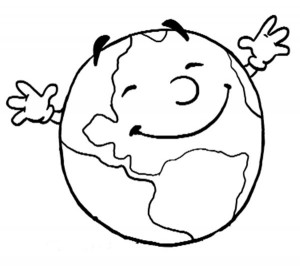
A
sweet
smile
on your face
does wonders
and changes
the lives of others
who weep,
who die with pain,
& who do not smile.
If you believe
you can change the whole
world
with a ‘smile’
not with logic
Millions hope for nothing,
even if they live,
there is no reason
why they leave
but they all live with a smile
If you wish to give,
give with a touch of smile
not with regrets
and see
The whole world smiles
and thanks to you
for making it cheerful
& peaceful
Pushkar Bisht,
New Delhi.
Violence breeds violence
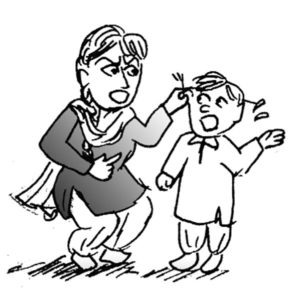
Sir,
Innocence is the beauty of childhood. A childhood devoid of innocence is no childhood at all. But what happens when instead of innocence permeating a child’s personality, we get glimpses of delinquent behavior? It surely is not a healthy sign.
In Pakistan, the increase in juvenile delinquency is synonymous with the fast fading innocence of our children. It indeed is a matter of grave concern for us. Lately, shocking incidents of juvenile delinquency have been reported that hint at the frustrated mindset of our little children. Such cases of extreme brutality compel us to question ourselves – how could our young ones transgress the limits of morality and kill fellows of the same age bracket? How could they be so brutal? What compelled them to resort to such violent acts?
Something did go wrong somewhere. And it is we, the society at large, who are to be blamed for stealing our children’s innocence. Aren’t we the ones who indoctrinate their tender minds to reciprocate violence with violence? Aren’t we the ones who instigate them to exact their revenge if beaten by another child? Aren’t we responsible for making them egotistical little beings who want to have their way irrespective of the repercussions? It is indeed we who bring violent video games for them on their slightest insistence, just because we don’t want them to keep nagging us. Don’t we allow them to view action movies, which are potentially dangerous for their mental health? Do not we allow them to view re-enactments of crime aired on televisions?
A research conducted by the University of Ontario recently shows action movies and video games instill in children a desire to replicate the same moves, as they involve glorification and gratification rather than a castigation and condemnation of such acts.
We know everything yet we do nothing about it. Why don’t we realize that children are children, and if we as elders do not have the potential to make them understand the difference between right and wrong, it is our fault and not theirs. If our children are unconsciously learning violent acts, it is we who are to be blamed.
It is time we as elders dispense our responsibilities properly and make sure our little angels do not transform into criminals. We need to know that violence, whether physical or visual, breeds violence.
Marria Qibtia Sikandar Nagra,
Lahore.

